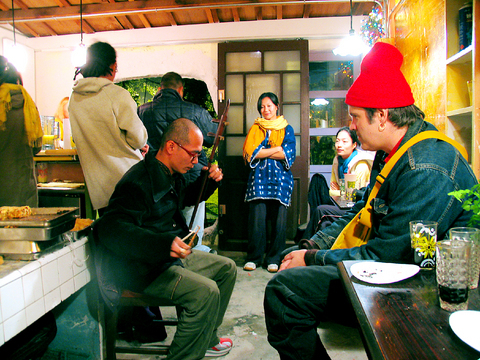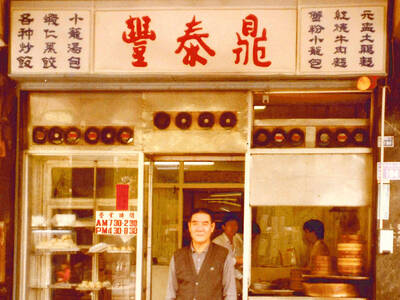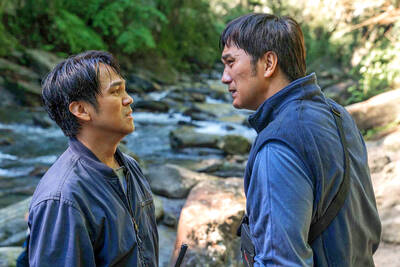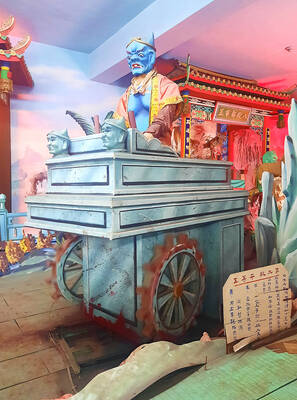The opening of a general store may not ordinarily warrant a mention in the newspaper, but the Treasure Hive, which opened its doors to the public at Treasure Hill last Sunday is part juice bar, part performance space, part soup kitchen, part grocery store, part local pub.
But it's mostly the latest chapter in the half-century saga that has seen Treasure Hill go from an anti-aircraft installation to an art installation.
"It's great to see somebody doing something here that is going to stay and to see this area revitalizing," said Yeh Wei-li (

PHOTO: DAVID MOMPHARD, TAIPEI TIMES
Treasure Hill got its start when the soldiers of the Chinese Nationalist Party (KMT) came to Taiwan.
The area was fortified and designed to protect the city's southwestern side from a Communist air attack. The soldiers stationed there built homes next to the guns they manned and married local girls.
By the time the guns were eventually removed, the area had become home and the soldiers stayed. Now there are ongoing plans to turn several of Treasure Hill's dilapidated structures into facilities that will host an artist-in-residence program.
Treasure Hive, located at the front of the community by a bicycle path that runs along much of the Danshui River, could be considered the first of the structures in the new artist community. Its proprietor, Mina Chin (覃敏怡), says she'll host weekly music performances on the lawn adjacent the store, will serve up a soup of the day, and plans to offer a variety of staple goods which she'll deliver to elderly locals.
The Treasure Hive is at 3, Alley 16, Ln 230, Dingzhou Rd, Sec. 3, Taipei (

March 24 to March 30 When Yang Bing-yi (楊秉彝) needed a name for his new cooking oil shop in 1958, he first thought of honoring his previous employer, Heng Tai Fung (恆泰豐). The owner, Wang Yi-fu (王伊夫), had taken care of him over the previous 10 years, shortly after the native of Shanxi Province arrived in Taiwan in 1948 as a penniless 21 year old. His oil supplier was called Din Mei (鼎美), so he simply combined the names. Over the next decade, Yang and his wife Lai Pen-mei (賴盆妹) built up a booming business delivering oil to shops and

Indigenous Truku doctor Yuci (Bokeh Kosang), who resents his father for forcing him to learn their traditional way of life, clashes head to head in this film with his younger brother Siring (Umin Boya), who just wants to live off the land like his ancestors did. Hunter Brothers (獵人兄弟) opens with Yuci as the man of the hour as the village celebrates him getting into medical school, but then his father (Nolay Piho) wakes the brothers up in the middle of the night to go hunting. Siring is eager, but Yuci isn’t. Their mother (Ibix Buyang) begs her husband to let

The Taipei Times last week reported that the Control Yuan said it had been “left with no choice” but to ask the Constitutional Court to rule on the constitutionality of the central government budget, which left it without a budget. Lost in the outrage over the cuts to defense and to the Constitutional Court were the cuts to the Control Yuan, whose operating budget was slashed by 96 percent. It is unable even to pay its utility bills, and in the press conference it convened on the issue, said that its department directors were paying out of pocket for gasoline

For the past century, Changhua has existed in Taichung’s shadow. These days, Changhua City has a population of 223,000, compared to well over two million for the urban core of Taichung. For most of the 1684-1895 period, when Taiwan belonged to the Qing Empire, the position was reversed. Changhua County covered much of what’s now Taichung and even part of modern-day Miaoli County. This prominence is why the county seat has one of Taiwan’s most impressive Confucius temples (founded in 1726) and appeals strongly to history enthusiasts. This article looks at a trio of shrines in Changhua City that few sightseers visit.